ASBMB members advocate for basic science
Twenty-five members of the American Society for Biochemistry and Molecular Biology from 20 states met with elected officials and their staffers in a total of 65 meetings on last week during the society’s annual Capitol Hill Day.
Members of the ASBMB Public Affairs Advisory Committee, chaired by Ann West, a professor of chemistry and biochemistry at the University of Oklahoma, and several delegates from the ASBMB’s 2023 Advocacy Training Program traveled to Washington, D.C., to stress the importance of protecting and sustainably funding basic scientific research.
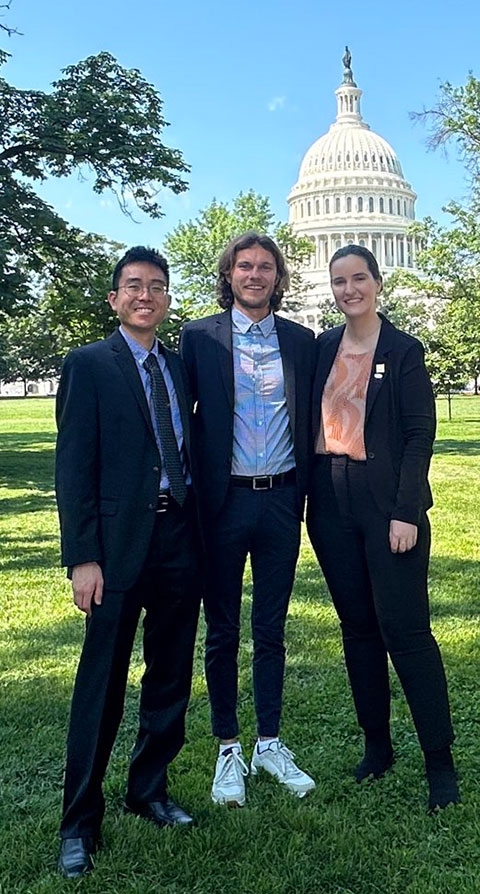
The fiscal year 2025 budget was front and center during all the meetings. The ASBMB members told legislators that the budgets of the National Institutes of Health, the National Science Foundation and the Department of Energy Office of Science must increase to sustain the U.S. scientific enterprise.
Steve Caplan, a professor of biochemistry and molecular biology at the University of Nebraska and a member of the PAAC, explained the importance of the annual visit to legislative offices.
“Fundamental research is one of the most important things for our society,” Caplan said. “I think it's something that's not understood and not appreciated enough.
“This is our opportunity to advocate — to educate the politicians and policymakers and help them better understand what research can do for society on an economic level and also how it brings advances to applied science that will drive growth and better health for the citizens of our country and the globe.”
Sarina Neote, ASBMB’s public affairs director, noted the need to close some funding gaps.
“The cost of training and doing research has increased due to inflation, and the federal funding has not kept up,” Neote said. “We’re encouraging scientists to share their stories during these visits to communicate the impact of biomedical research and how flat or falling federal grant budgets harm science, and to advocate for increased budgets.”
Specifically, the ASBMB members asked their senators and representatives for:
-
$51.3 billion for the NIH’s fiscal 2025 budget to support its intramural and extramural programs that fuel discovery-based biomedical research.
-
$11.9 billion for the NSF’s fiscal 2025 budget to support the funding of fundamental research across all scientific disciplines
-
$9 billion for the DOE’s fiscal 2025 budget to support its Office of Science and the national labs
The NIH and NSF budgets were not increased in fiscal 2024.
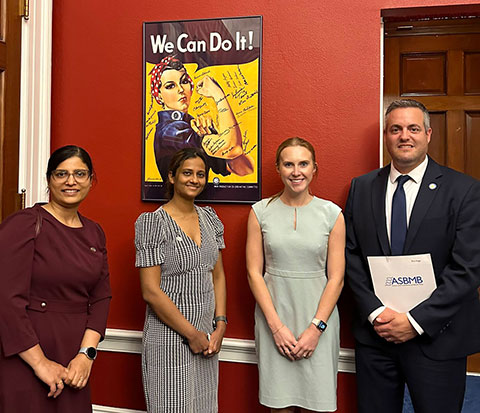
For fiscal 2025, President Joe Biden has requested $48.6 billion for the NIH; this is about $920 million more than the agency’s fiscal 2023 and 2024 budgets, or a 1.8% increase.
“The NIH needs at least a 5% increase for fiscal 2025 to cover the rising cost of science and to ensure scientific progress is not lost and the nation’s biological and biomedical enterprise will thrive,” Neote said.
Veteran advocates and new voices
Some of the ASBMB members at Hill Day were veteran advocates; others were visiting legislators for the first time.
Wednesday was the eighth Hill Day for Rick Page, a professor of biochemistry at Miami University, Ohio, and past PAAC chair. Page said he was particularly pleased to meet with Sen. J.D. Vance R-Ohio, who took office in 2023, and improve the connection between the Vance office and ASBMB.
“I tried to educate the Vance office on the importance of biomedical research, why we do it, why it's important to fund it and what the impacts are for all of us, his constituents,” Page said.
“This is not just about walking by and dropping materials, saying thank you and moving on. We're here as experts to help answer questions now and throughout the year. We’re really helping them do their jobs and serve their constituents as effectively as possible.”
Page, along with 2023 ATP delegates Nidhi Shukla and Isha Verma, met with the office of Rep. Warren Davidson, R-Ohio, who has not historically been a proponent of combatting climate change.
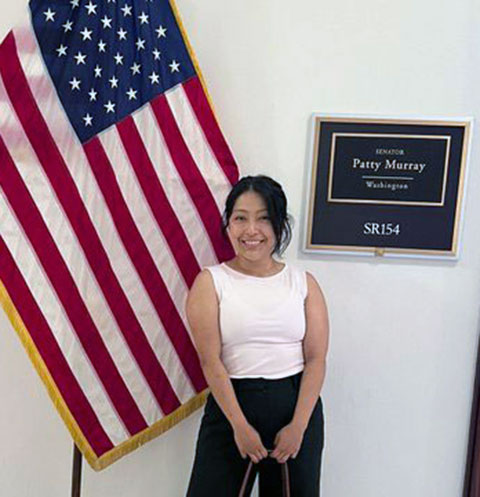
Shukla, a postdoctoral fellow at Case Western Reserve University, said her goal in these meetings was to communicate the importance of renewable energy research, the topic of her ATP project.
PAAC members Shantá D. Hinton, a professor of biology at the College of William & Mary, and Matthew Koci, a professor of immunology, virology and host–pathogen interactions at North Carolina State University, teamed up and met with Sens. Ted Budd, R-N.C., and Tim Kaine, D-Va.
“I think these meetings are a great opportunity to thank them,” Hinton said, “especially Tim Kaine’s office, for what they've already done to support science and show them that we are paying attention, and we appreciate it.”
Kaine champions science, technology, engineering and mathematics education as well as efforts to counteract climate change. He recently allocated funds to establish an Interdisciplinary Climate Science Degree Program at Hampton University, a historically Black research university in Virginia. In 2022, Kaine supported the CHIPS and Science Act.
“I felt like Kaine and Budd’s offices were very receptive to what we have to say,” Hinton said. “We decided not to bombard them with numbers and to just have a conversation about the importance of sustainable and increased funding and how it will fuel the next-generation pipeline.”
Educating lawmakers about scientific impact
ASBMB President Ann Stock, a professor of biochemistry and molecular biology at Rutgers University, and ASBMB CEO Mona Miller also met with policymakers to advocate for basic scientific research funding.
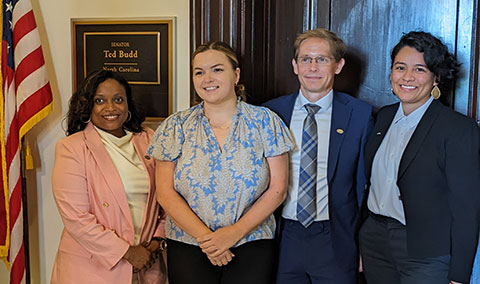
Stock, along with Kevin Gardner, a professor of biochemistry and structural biology at City College of New York, spoke with staffers from the office of Rep. Frank Pallone Jr., D-N.J. Like Kaine, Pallone supported the CHIPS and Science Act.
“It’s a great opportunity to let our elected leaders know how important this funding is to enable basic research that fuels translational advances, trains the next generation of bioscientists and stimulates the bioeconomies in their states,” Stock said.
Caplan, Miller and West spoke with staffers from the office of Rep. Tom Cole R-Okla. Cole is committed to accelerating scientific and technological innovation in Oklahoma and is a member of the STEM Education Caucus.
“Most of our lawmakers are in a position to pass legislation that includes appropriations for federal funding agencies that in turn fund our research,” West said. “We educate them as to what kind of research we do and why it's really important and has societal impact.”
Hill Day is over, but ASBMB members can still let their congressional representatives know the importance of basic scientific research funding by participating in the society’s letter-writing campaign.
Miller, who once worked in the office of Maryland’s Sen. Barbara Mikulski, knows firsthand the value of advocacy.
“The ASBMB is a powerful advocate for greater investment in fundamental discovery science, and we shared that message across Capitol Hill,” Miller said. “We thank ASBMB members for participating in Washington and urge members across the country to take part in ASBMB’s letter-writing campaign to contact their own members of Congress. Constituent voices matter to ensure research will be a top priority. The ASBMB makes it easy and effective to add your voice for research.”
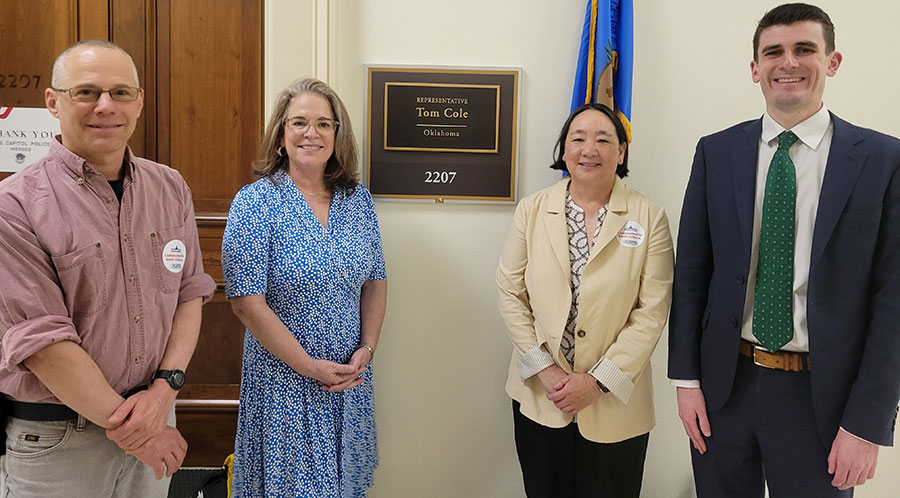
Enjoy reading ASBMB Today?
Become a member to receive the print edition four times a year and the digital edition monthly.
Learn moreGet the latest from ASBMB Today
Enter your email address, and we’ll send you a weekly email with recent articles, interviews and more.
Latest in Policy
Policy highlights or most popular articles

Embrace your neurodivergence and flourish in college
This guide offers practical advice on setting yourself up for success — learn how to leverage campus resources, work with professors and embrace your strengths.

ASBMB honors Lawrence Tabak with public service award
He will deliver prerecorded remarks at the 2025 ASBMB Annual Meeting in Chicago.

Summer internships in an unpredictable funding environment
With the National Institutes of Health and other institutions canceling summer programs, many students are left scrambling for alternatives. If your program has been canceled or delayed, consider applying for other opportunities or taking a course.

Black excellence in biotech: Shaping the future of an industry
This Black History Month, we highlight the impact of DEI initiatives, trailblazing scientists and industry leaders working to create a more inclusive and scientific community. Discover how you can be part of the movement.

ASBMB releases statement on sustaining U.S. scientific leadership
The society encourages the executive and legislative branches of the U.S. government to continue their support of the nation’s leadership in science.
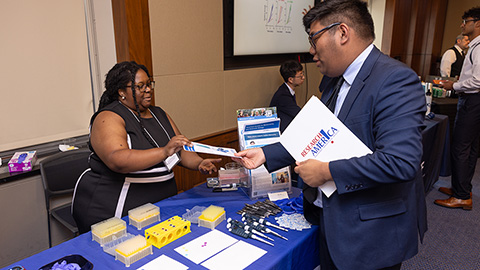
ASBMB and advocacy: What we accomplished in 2024
PAAC members met with policymakers to advocate for basic scientific research, connected some fellow members with funding opportunities and trained others to advocate for science.

